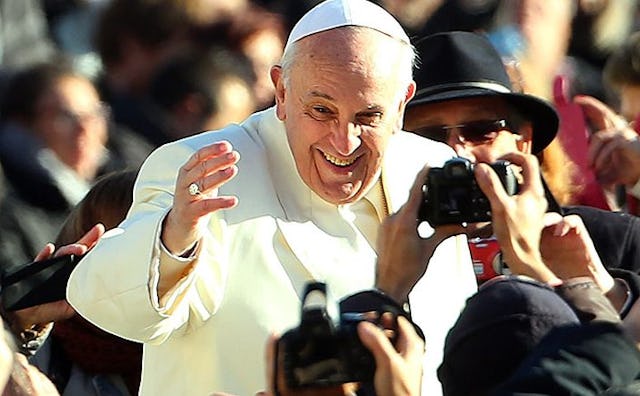Why (Almost) Everyone Still Loves Pope Francis

Now, however, the former Cardinal Jorge Mario Bergoglio of Argentina is more popular than ever.
Worldwide, 6 out of 10 people view him favorably. Narrow the focus and he’s even more popular. Nine out of 10 Catholics have a favorable view of the pope, and 6 out of 10 have a “very favorable” view.
(Who doesn’t like him? People who live in the Middle East, where an equal 25 percent rate him favorably and unfavorably, according to The Washington Post.)
“Francis has made the face of the papacy irreversible,” wrote an Italian Vatican analyst Marco Politi. “Returning to a doctrinaire, absolute monarch, icon-pope will never be possible.”
What are the keys to his popularity and leadership? Here are the top five.
© Vicenzo Pinto/AFP/Getty
He chooses the right symbols
Let’s start with the name that the man formerly known as Cardinal Jorge Mario Bergoglio chose for himself as pope: Francis, in honor of St. Francis of Assisi, according to a Vatican spokesperson. He wanted his papacy to be a celebration of the poor.
The name was fitting: St. Francis, known as the patron saint of animals and the environment, was a 12th century soldier-turned-preacher who embraced a life of poverty. “Cardinal Bergoglio had a special place in his heart and his ministry for the poor, for the disenfranchised, for those living on the fringes and facing injustice,” his spokesperson told CNN shortly after he was named.
Then, Pope Francis made headlines by eschewing some of the more ostentatious perks of his office. Instead of living in the papal palace, he lives in a small apartment, and instead of the Mercedes his predecessor used, he cruises around the Vatican in a five-year-old Ford Focus (and a stripped-down model, at that).
In other words, chances are your car is nicer than the pope’s. That’s a poignant message.
He projects an aura of humility
Besides the car and the apartment, the pope has made headlines with a few simple gestures that suggest an aura of humility. After his surprise election, he went by the hotel where he’d been staying to settle his bill in person. Then he called a newsstand in his home city of Buenos Aires to cancel his morning paper. (For that matter, find me another head of state who carries his own briefcase when he travels.)
Perhaps more substantively, Francis officiated Holy Thursday services not at St. Peter’s Basilica but at an Italian youth prison. He washed the feet of the inmates as part of the service, including those of a Muslim woman.
Humility is an under-appreciated leadership style. The only problem in drawing lessons here is that researchers have found it only works for men. A study in the Academy of Management Journal found that “humble leaders are more effective and better liked,” but that humility often backfired for “young, nonwhite or female leaders,” because they “were reported as having to constantly prove their competence to followers.”
Regardless, the strategy seems to be working here.
He seems to be open to ideas
To be clear, Pope Francis is not going to come out in favor of gay marriage, or female or married priests, or sanctioning divorce. The Catholic church is slow to change, but in his own way Francis seems to be pushing for reform.
The pope has written that priests should welcome divorced and remarried Catholics and allow them to be active in parishes, and he has called priests who would not baptize the children of single mothers “today’s hypocrites.”
Francis also seems to be working hard to shepherd other church officials to follow his lead. He skipped an ornate concert in his honor, leaving his white throne conspicuously empty, and lectured bishops that they should be “close to the people” and avoid “the mentality of a prince.”
He reaches out to people
A world leader can’t spend all his time doing this, but the pope has made headlines for some very small efforts, like calling ordinary people on the telephone to offer prayers or wish them well. As Time.com recalled:
There was the call to Michele Ferri, the 14-year-old brother of a gas station operator who had been killed in an armed robbery; a call to a Vatican critic who was sick in the hospital; a call to an Italian woman who had beseeched the Pope in a letter to help her solve the mystery of her daughter’s murder; and many more that have not been reported in the media.
Another time, the Pope called a group of nuns in a convent to wish them Happy New Year. When he got their answering machine, he left a joking message: “What are the nuns doing that they can’t answer?”
He speaks his mind
Just before Christmas, the Pope called the top cardinals and bishops of the Vatican in for a little conversation. It’s normally the kind of end-of-year pep talk a lot of bosses might give—but Francis instead took the opportunity to tear into the clergymen, offering a “scathing critique” of the Vatican bureaucracy, and ticking off what he called 15 “diseases in their work and attitudes.”
The list of transgressions—from self-aggrandizement and lack of compassion to bureaucracy and vanity—had people around the world mouthing Amens.
A version of this article appeared previously on Inc.com.
This article was originally published on